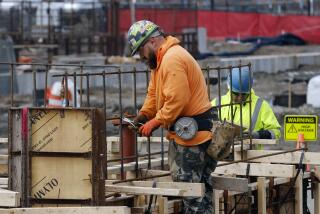Despite Dow’s record close, small businesses still struggle
The stock market is flying high, but much of small business America remains grounded.
Unlike the big corporations that have been raking in huge profits and stoking the stock market toward the record close Tuesday for the Dow Jones industrial average, most small firms have yet to enjoy the fruits of the nearly 4-year-old recovery.
Even though some small employers are starting to see daylight, particularly with the housing market coming back to life, analysts and business owners paint a picture of companies still hampered by weak sales and pangs of uncertainty, particularly over tax and government policies.
Small businesses typically have been engines of job creation, but their lagging performance, along with a sharp drop in the rate of new start-ups, has been a key reason employment growth has remained mediocre.
Since the jobs recovery began in February 2010, employment at companies with 1,000 or more workers has grown by more than 8%, according to payroll processor Automatic Data Processing and research firm Moody’s Analytics.
But for firms with fewer than 20 employees, which constitute the bulk of businesses, the net job increase has been just 3.4% over that period, though the gap has narrowed somewhat in the last year.
The payroll tax increase at the start of this year and the government spending cuts that began Friday won’t help matters. Combined, they are expected to slow economic growth markedly this year, which will probably hit smaller businesses harder because they have less financial cushion to absorb temporary jolts.
The most recent survey by the National Federation of Independent Business, a major trade group for small employers, found that its confidence index had ticked a little higher in January but remained at one of the lowest levels in four decades.
Optimism is stronger in some regions, such as the Bay Area, which is enjoying a tech-driven boom, but relatively few firms across the country indicate plans to hire or invest in new equipment.
“There’s a disconnect,” said Champ Land, 60, a furniture maker in Troutman, N.C., who employs 26 workers. “I’ve got money in the stock market, and I’m feeling some of it,” he said of Tuesday’s surge on Wall Street.
He considered the disconnect between Wall Street and Main Street bittersweet. His business, Troutman Chair Co., and others in his industry are still struggling to recover from the Great Recession.
“Small-town America is not feeling it,” Land said.
Economists point to a number of factors for the gap between multinational giants and little firms, such as Troutman.
Small businesses were hit disproportionately hard by the downturn because they dominate the real estate industry. When the housing market collapsed, many mom-and-pop operations saw an erosion not only in sales but also in the value of their own properties, which many had used to support their business.
Federal Reserve data show that demand for loans from small businesses is picking up, but credit remains tight. With fewer community banks and without the option to tap capital markets, many small employers have few places to go for cash.
Financing is one side of the problem. The bigger obstacle has been slow sales.
Consumer spending has been uneven and mostly weak, and small companies have not benefited nearly as much from the recovery in U.S. manufacturing and increased exports.
Researchers at Citigroup estimate that large firms, those with 500 or more employees, account for two-thirds of U.S. exports. In part, this has been aided by the weakening dollar, which “systematically raises large-firm employment relative to that of small firms,” the Citigroup economists concluded.
For this and other reasons, they said in a recent report, the “small firm sector is under substantial stress.”
The nascent housing market recovery is beginning to help some companies. One of them is Power Curbers Inc., a construction equipment maker with plants in Iowa and North Carolina. Its president, Dyke Messinger, said that he recently added employees for the first time in nearly five years, bringing his head count to 90. He had 120 before the recession.
“It was like time stopped for five years, and now they’re waking up,” he said, noting that his customers are slowly starting to trade up their old equipment. “It’s not significant, but it’s better.”
For now, Messinger said he does not have plans to add more workers; he wants to sit tight and see how the economy progresses. He does not expect the new round of federal budget cuts under the so-called sequestration to hurt him because he relies mostly on new construction and not infrastructure work.
His hesitancy to bulk up partly reflects uncertainties about government policies.
“Are we as a nation going to adopt fiscal policies that will create incentives for businesses to grow?” he asked.
Such concerns are common among small-business operators, many of whom are conservatives and believe Washington doesn’t understand or respond to their needs. And while many corporations, such as General Electric Co., are likely to keep investing and hiring amid the uncertainty, that’s not the case with the smaller players.
One of the things that Kim Megonigal, chairman of Irvine employment agency Kimco Staffing Services, is trying to figure out is what the new healthcare requirement will cost employers.
Beginning in 2014, companies with 50 or more employees will face a penalty if they do not provide health insurance to their workers. Many businesspeople think that the new law will restrain hiring by small businesses.
That worries Megonigal. He said his offices in the state have seen a full recovery of business among large clients as logistics and warehousing work has increased. But his more profitable line of small-business customers has yet to come back.
“I don’t understand it. Small businesses aren’t growing as fast as they used to in the past,” he said. “They don’t have a reason to invest in staff.”
More to Read
Inside the business of entertainment
The Wide Shot brings you news, analysis and insights on everything from streaming wars to production — and what it all means for the future.
You may occasionally receive promotional content from the Los Angeles Times.











